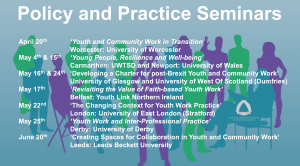Search Results (365)
Showing results using some of your search terms
TAG Seminar Carmarthen: Young People, Resilience and Well-being – Nick Hudd

Caerphilly Youth Service Curriculum Framework
The curriculum outlines the learning that takes place through youth work and the range of opportunities offered to young people. It is designed to be flexible, allowing youth workers and young people opportunities to jointly plan activities and programmes that will develop and challenge young people and youth workers, and encourage their creativity and innovation.
Session plan – Stress discussion
Session plan – self esteem and friendship
The session is made of 4 activities with different purposes:
1. to break the ice with all the members of the group
2. to reflect individually through creativity
3. to play and strengthen bonds through competition
4. to release emotions, boost empathy and cooperation using artistic skills.
The session is very relaxing, and meant to be carried out in a calm atmosphere, where emotions and creativity will flow.
Impact: will be developing a sense of belonging with the group, to strengthen the relationships with the other members, to develop empathy, positive thoughts and enhance one's own confidence and self-esteem.
Materials: Colours, papers, pens and pencils will be enough!
My top tips:
1. To explain the aim of the session in the beginning and to make a proper final discussion in the end, allowing each young person to reflect on what they've learned and expressing their thoughts.
2. Take your time to do the activities, if you see that you are running out of time just do what you can and try to extend the session another time. Let the young people enjoy and interact with the time they need. Each group is different, adapt the activities and timings depending on the group you have.
3. At the end of the session, find a space in the room where you can hang the pictures of the Hands and the Affection Portraits. This way the Young People will see the result of their work and they will have a positive feeling every time they see their drawings.
Using reflective practice models to evaluate own performance
MA student assignment for the module Mastering Professional Learning.
"Using a reflective model of practice critically evaluate your own performance within your professional setting. This should include a critical evaluation of your practice together with learning opportunities and assessment you have provided."
Challenges and opportunities for Youth Workers in Wales
Summer Scheme Application & Evaluation Report
Report covers: aims and objectives; full programme; costings; and evaluation.
The Conflicted Practitioner
EE Revisited Introduction
Introduction to a series of nine papers taken from a research Ph.D. They are focused on data about the maintained Youth Service in Wales, collected and analysed from 2002 to 2007 when the Youth Service was first being directed by the Welsh Government policy ‘Extending Entitlement’. These are being published in 2017 as there are issues which need to be considered due to the reinvigorated political interest in Extending Entitlement. These papers are intended to be a reminder that the translation of Extending Entitlement policy into practice was not a positive experience for the Youth Service in Wales and that there are inherent dangers that a refreshed Extending Entitlement will have just as many negative connotations unless we learn from, and respond to, the lessons from the past. The papers are:
Extending Entitlement Revisited:
- Paper 1: Setting the scene
- Paper 2: How was the evidence found and analysed?
- Paper 3: The needs of young people and the Maintained Youth Service response
- Paper 4: What did politicians want from the Maintained Youth Service?
- Paper 5: How Knowledgeable were those working in the Maintained Youth Service of its discrete identity during the time of the Extending Entitlement launch?
- Paper 6: Did the Maintained Youth Service have the tools to meet the priorities of Extending Entitlement?
- Paper 7: What was happening in the Maintained Youth Service at the time of Extending Entitlement?
- Paper 8: What did the Maintained Youth Service do after Extending Entitlement and how was this measured?
- Paper 9: Findings and recommendations
Well-being, resilience and happiness
Presentation on well-being, reslience and happiness, given to a research conference at University of South Wales.
